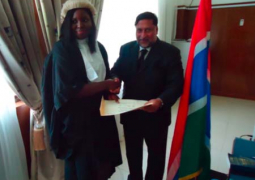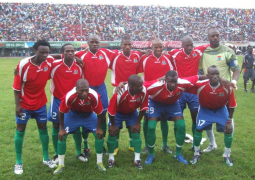Karamo Sanneh, on 3 July 2013, continued his testimony against the Gambia Teachers’ Union before Magistrate Jobarteh, chairman of the Kanifing Industrial Tribunal, and his two panelists, Njie and Davies.
Karamo Sanneh, plaintiff, told the tribunal that on 28 June 2008, and 24 July 2008, he was accused of absenting himself from duties by the defendant when it was not true.
He said he was on duty on both days.
His counsel, Akinbo, showed him a duty diary which he identified.
Lawyer Akinbo then applied to tender the duty diary and the defendant‘s counsel, Kebba Sanyang, did not raise any objection.
The tribunal admitted the said document.
Sanneh posited that he was again accused by the defendant on 26 October 2012, that he absented himself from duties.
He said he did so on the grounds that this particular day fell on his day-off, adding that it was because of the manipulation on the roster by the programme officer that he was put on off-duty on this particular day.
He adduced that this day fell on a public holiday when he was supposed to be off-duty but he was forced by the defendant to work without compensation.
Sanneh testified further that on 4 and 5 November 2012, he fell ill, adding that he went to inform one of his colleagues, who was his junior, that he was going to the hospital and his colleague told him that he could go home.
He posited that at the Kanifing Hospital, he was diagnosed and went under lab test and it was discovered that he was suffering from Malaria.
He stated that he was given some medication and was given two days’ ED (Excuse of Duty).
His counsel then applied to tender the ED document and the defendant’s counsel did not object to the tendering of the said document. It was admitted by the tribunal.
Sanneh further told the tribunal that from the hospital, he went back to work and informed his co-worker, Lasana Jaiteh, that he was given two days’ ED and asked him if he had credit on his mobile phone so he (Sanneh) could inform the management.
He added that he wrote in the diary and explained his condition and told Lasana Jaiteh to inform the management the following day.
He stated that he was surprised that the management said they could not accept the ED on the grounds that he did not inform them.
Sanneh further told the tribunal he told the management that he could not inform them at that instance.
He said he was surprised that one of his colleagues, Faburama Saidykhan, had complained that he was sick and stayed at home and sent his wife to inform the management that he could not come to work, and he was granted 10 days off-duty without producing a medical paper.
He adduced that the defendant went ahead and terminated his appointment by a letter dated 14 December 2012.
Lawyer Akinbo, at this juncture, applied to tender the termination letter, and the defendant’s counsel, Kebba Sanyang, did not make any objection.
The tribunal admitted the said letter.
Sanneh further narrated that on 24 December 2012, he wrote to the acting-Commissioner of Labour and notified him about the unlawful termination of his employment by the defendant.
His counsel again applied to tender the letter he wrote to the acting-Commissioner of Labour and the defendant’s counsel did not raise any objection.
The said letter was admitted by the tribunal.
Sanneh said after writing to the acting-Commissioner of Labour, no action was taken, adding that he was receiving D3,379 as his salary at the time his service was terminated.
Lawyer Akinbo then applied to tender his pay slips after identifying them. The defendant’s counsel did not object to the tendering of the documents.
The tribunal, as a result, admitted the said documents.
Sanneh finally ended his testimony by telling the tribunal that he was born on 10 February 1970, and he relied on the praecipe he filed against the defendant.
Kebba Sanyang, the defendant’s counsel, rose and started cross-examining the plaintiff to discredit, contradict and challenge him.
He asked the plaintiff whether either party had the right to terminate the employment.
Karamo Sanneh, in response, said either party had the right to terminate the employment based on the justification of the termination and whether it was in accordance with the law, although this was not stated in his appointment letter.
At this juncture, the case was adjourned till 9 July 2013, for the continuation of the cross-examination.




